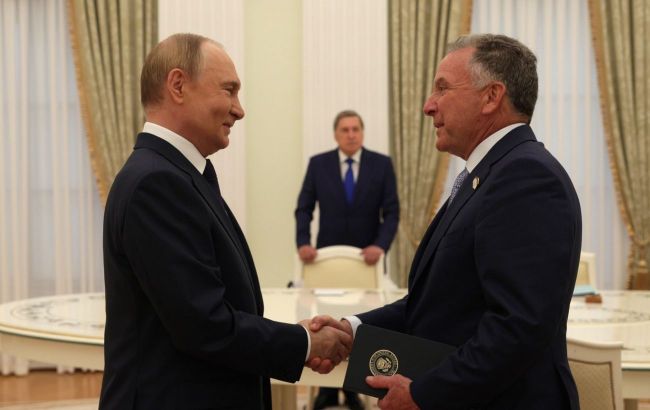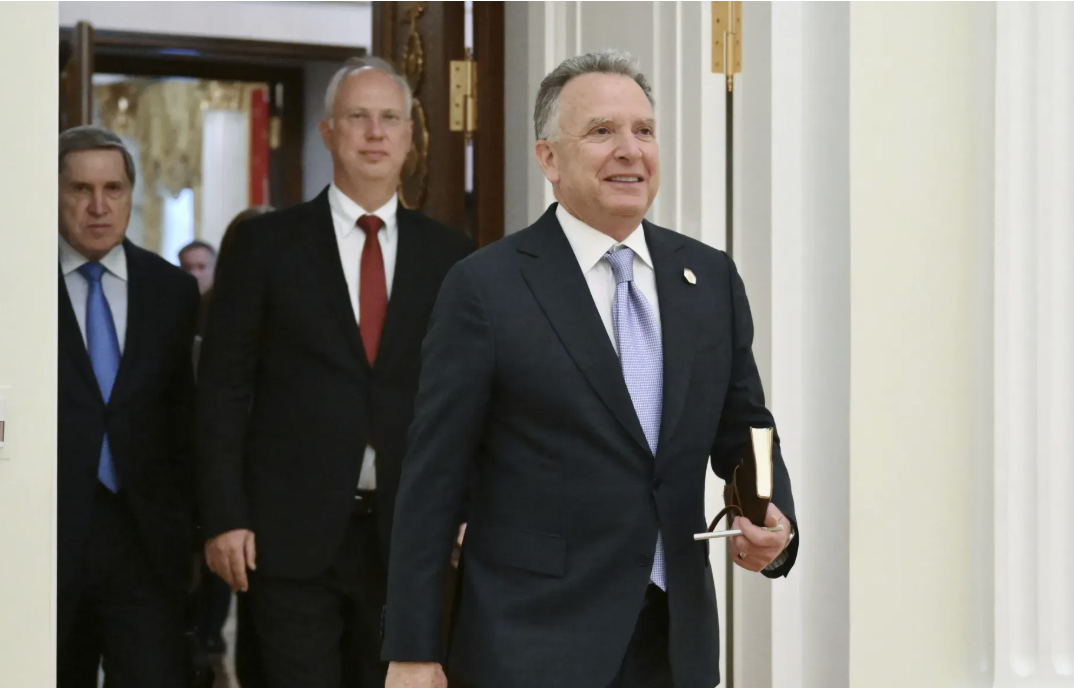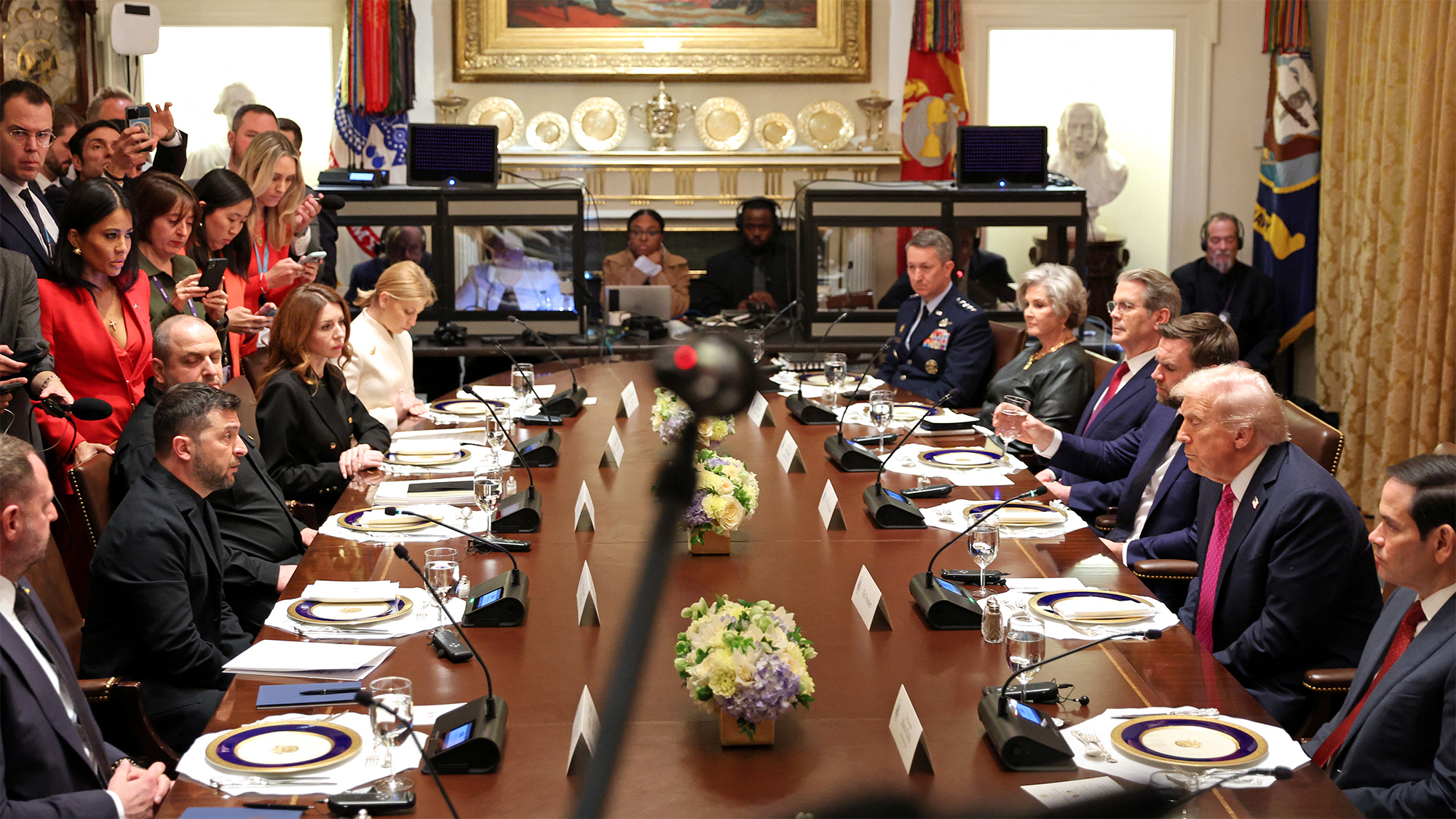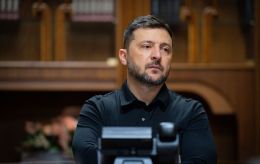Leaked calls: Trump envoy advises Kremlin on framing Ukraine peace proposal
 Putin and Witkoff shake hands in the Kremlin, with Ushakov in the background (photo: Getty Images)
Putin and Witkoff shake hands in the Kremlin, with Ushakov in the background (photo: Getty Images)
American special envoy Steve Witkoff advised the Kremlin on how to present its peace proposal so that Donald Trump would accept it. The US president's reaction followed quickly, and criticism has already erupted in Congress.
What is in the Bloomberg leaks, and how are Trump and the participants of the transcript reacting to it - read in the RBC-Ukraine material below.
Witkoff–Ushakov conversation
The Bloomberg news agency published transcripts of negotiations between US and Russian officials. In the first one, Trump's special envoy, Steve Witkoff, advised Kremlin chief of staff aide Yuri Ushakov on how Putin should better present a peace plan for Ukraine.
In the second, Ushakov and another Kremlin official, Kirill Dmitriev, discuss how to pass the Russian proposals to the Americans so that they would present them as their own plan.
Bloomberg published the transcript of the October 14 phone call between Witkoff and Ushakov. The recording, which runs more than 5 minutes, shows Witkoff giving advice to the Kremlin representative. This conversation appears to have become the starting point for the US peace proposal, which consists of 28 points.
In particular, Witkoff suggested arranging a call between Putin and Trump before Ukrainian President Zelenskyy's visit to the White House on October 17.
"Well, listen. I am going to tell you something. I think, I think if we can get the Russia-Ukraine thing solved, everybody’ll be jumping for joy," Bloomberg quotes Witkoff as saying.
In response, the Kremlin aide asked him when a conversation between Trump and Putin could be arranged. Witkoff confirmed that such a conversation was possible and "useful" and suggested how to properly prepare the contact.
"Zelenskyy is coming to the White House on Friday. I will go to that meeting because they want me there, but I think if possible, we have the call with your boss before that Friday meeting," Bloomberg quotes Witkoff as saying.
Ushakov asked Witkoff whether it would be useful for Putin to call Trump. The American replied in agreement and also recommended that Putin congratulate Trump on achieving the Gaza ceasefire agreement, affirming Russia's support for him and stating that he respects the US president and recognizes his role in the peace process.
The US special envoy also proposed developing a 20-point peace plan for Ukraine similar to the Gaza truce agreement. During the conversation, the topic of a possible territorial exchange, including regarding Donbas, was raised, but Witkoff advised discussing this very delicately.
Two days later, Trump and Putin held a lengthy phone call, which the American leader described as "very productive," and he announced preparations for a summit in Budapest, which ultimately did not take place.
In addition, Zelenskyy's visit to the White House on October 17 took place amid tense circumstances. In particular, the Ukrainian delegation returned home without the long-range Tomahawk missiles, the possible provision of which the US president had mentioned shortly before.
Ushakov–Dmitriev conversation
After the conversation between the US special envoy and Ushakov, Witkoff met in Miami with Kirill Dmitriev, another high-ranking Kremlin adviser who is the head of the Russian Direct Investment Fund (RDIF) and also took part in US–Russia talks earlier this year.
As Dmitriev himself said in an interview with Axios, he spent three days in Miami starting on October 24. On October 29, Dmitriev and Ushakov spoke by phone and discussed how firmly Moscow should insist on its demands in any peace proposal, according to another recording that also ended up with Bloomberg.
In this conversation, Dmitriev suggests giving Witkoff a Russian draft of the peace plan so that he can rephrase it and present it as "their own."
 Steve Witkoff, Yuri Ushakov, and Kirill Dmitriev (photo: Getty Images)
Steve Witkoff, Yuri Ushakov, and Kirill Dmitriev (photo: Getty Images)
Ushakov, however, says he is worried. He claims that Witkoff will change the plan, and the Russian demands will be misinterpreted and uncoordinated. In response, Dmitriev tells him that he will tell Witkoff to keep everything word-for-word and that everything will be done carefully.
Later, Dmitriev called the Bloomberg agency that released the transcript of his conversation with Ushakov a fake.
"Fake," he wrote in the comments under Bloomberg's post on the social network X.
How Trump reacted to the leaked recordings
US President Donald Trump commented on the leaked recording of the Witkoff–Ushakov conversation, saying that there is nothing unusual about such consultations.
He said he had not listened to the recording but suggested that his envoy had advised "the same thing to Ukraine."
According to the White House's head, this is a "standard form of negotiation," in which a mediator sells the terms to both sides, convincing each side of the concessions and benefits.
"You know, because he's got to sell this to Ukraine. He's got to sell Ukraine to Russia. That's what he is. That's what a dealmaker does. You got to say, "Look, they want this. You've got to convince them with this." You know, that's a very standard form of negotiation," Trump said.
What Ushakov says about the leaked recordings
Putin's aide claims that the leak of conversations published by Bloomberg "could not have come from any of the participants." He considers "surveillance" the most likely explanation for the leak.
"Yes, there are contacts via secure communication, where leaks almost never happen unless one of the sides deliberately allows them. But there are also some conversations over WhatsApp, which in general someone, in some way, can probably listen to," Ushakov said.
According to him, none of the participants in the conversation "is interested in making its contents public."
"Perhaps someone is eavesdropping. Someone is leaking information, but it is definitely not us," Ushakov claims.
In the US, Witkoff was called a "traitor"
Following the leak of the conversations, members of the US Congress have already called for Steve Witkoff to be removed from negotiations to resolve the Russian-Ukrainian war.
Republican Congressman Don Bacon said that Witkoff "fully favors the Russians" and "cannot be trusted." He urged the special envoy's dismissal because he had discredited himself.
"Would a Russian paid agent do less than he? He should be fired," Bacon wrote.
Republican Brian Fitzpatrick and Democrat Ted Lieu also called the situation serious, describing Witkoff as an "actual traitor."
The Telegraph notes that Witkoff advised Ushakov to "shower Trump with praise," casting doubt on the entire negotiation process and suggesting excessive closeness to Moscow.
Sky News calls Witkoff a "useful idiot" who has increased risks for Ukraine and Europe. Under normal circumstances, the outlet writes, such an official would be dismissed as hopelessly compromised, but under Trump, scandals have lost their meaning.
Is the US peace plan actually Russian?
Senator Angus King stated that US Secretary of State Marco Rubio, during a meeting with critics of Trump's 28-point plan, said that the document "was not the administration's plan" but a "wish list of the Russians." Rubio himself denied this.
However, Western media, citing sources, report that the plan was based on a Russian-authored document that was handed to the Trump administration last month.
 Zelenskyy's meeting with Trump on October 17 (photo: Getty Images)
Zelenskyy's meeting with Trump on October 17 (photo: Getty Images)
In mid-October, Moscow sent US officials a text outlining terms for ending the war, including concessions that Ukraine rejected — in particular, concerning parts of territory in the east of the country.
Journalists noted that some of the wording reads naturally in Russian but sounds strange in English.
According to Reuters, some US officials, including Rubio, indicated that Ukraine was unlikely to agree to such demands.
Last week, the US peace plan for ending the war in Ukraine became public. Russia initially denied its existence, though media quickly reported that Putin's ally, Kirill Dmitriev, had been involved in drafting the plan.
Later, the Kremlin confirmed familiarity with the 28-point draft document, though it claimed it had not been officially shown the plan.
US President Donald Trump initially set a November 27 deadline for Ukraine to respond. After negotiations in Geneva, the Ukrainian and US delegations removed contentious points, including those related to territory, amnesty, and the size of the Ukrainian Armed Forces.
The updated plan has not yet been published, and the key points are expected to be discussed in person by Zelenskyy and Trump.
As a result, the 28-point plan was reduced to 19–22 points. In addition, in Abu Dhabi, US Army Secretary Daniel Driscoll held talks with the Russian side, although the Kremlin officially denies that a peace plan was discussed with the American official.
Kyiv currently expects a Zelenskyy–Trump meeting before the end of November to finalize the peace agreement.
Meanwhile, Trump announced that Witkoff will travel to Moscow next week for talks on the peace agreement during a meeting with the Kremlin leader.
More about the peace plan and its current stage — in the RBC-Ukraine report.
Sources: Sky News, The Telegraph, Bloomberg, Axios.

